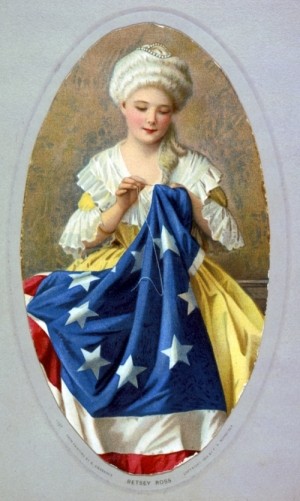Revolutionary war women were able to play a significant role, specifically because men looked down upon them.

Betsy Ross sewing the first American flag
Because women were considered too simple to understand complex military strategy during the American Revolution, men spoke freely around them. Thus, they made great spies, providing food and peddling wares to enemy camps while listening for important information.
Ann Bates is one such person. A Philadelphia schoolteacher, loyal to the crown, she assumed a false name and pretended to peddle while counting Continental Army troops and supplies for the British.
Unfortunately, this means that the most significant women in the Revolutionary War may be completely unknown to us. Many were probably never caught spying, and their secret role may never have been documented.
“Miss Jenny,” for example, is known only from a letter written from fooon Ottendorf to the British general, Sir Henry Clinton. We don’t even know her real name!
How many others played similar roles in the American Revolution may never be known.
It was not only spies, however, that affected the Revolution. Some women, like Abigail Adams, wife of future president John Adams, supported the cause in other ways, nursing injured soldiers, providing supplies, and even creating much needed ammunition!
- Hannah Blair was a Quaker who, although sworn against violence by her religion, wanted to support the Patriot cause. She protected soldiers passing through, gave medical help and food, carried secret messages, and mended uniforms. When the Loyalists found out, they burned her farm down. After the war, Congress granted her a small pension for her services. Very little else is known about Hannah Blair. Whether she was married, had children, had religious scruples in volunteering for a war—these are all mysteries that vanished with time.
- Margaret Corbin was the first American woman to receive a pension as a soldier. Her story is told as part of the Molly Pitcher legend.
- Lydia Darragh, a pacifist Quaker like Betsy Ross, made her mark in history by acting when opportunity arose.
- Mary Draper, who provided food, clothing, hospitality, and ammunition to the Patriot troops.
- Deborah Read Franklin was Benjamin Franklin‘s wife and companion for 44 years.
- Dicey Langston’s exploits earned her the nickname “Daring Dicey.”
- Sybil Ludington is known as the “female Paul Revere“, for riding in the night to warn the Colonial troops of the approaching British.
- Mary Ludwig Hays McCauley’s story is told as part of the Molly Pitcher legend. She (wo)manned an artillery cannon in her husband’s place when he was injured in battle.
- Esther Reed was the wife of a Revolutionary War General, and a civic leader who formed the Ladies Philadelphia, provided relief for soldiers, and spoke politically to gain support for the war effort.
- Deborah Samson actually fought for the colonial army.
- Mercy Otis Warren advised presidents and generals while writing political plays, becoming perhaps the most influential woman in American history.
- Martha Washington was the first first lady, and the support for commander-in-chief George Washington throughout the war.
And we must not forget to mention Betsy Ross, the most famous of Revolutionary War women, who inspired the cause by producing the first American flag in the summer of 1776. (You might also want to read the story of the Star-Spangled Banner, though that famous flag was not sewn by Betsy Ross.)


